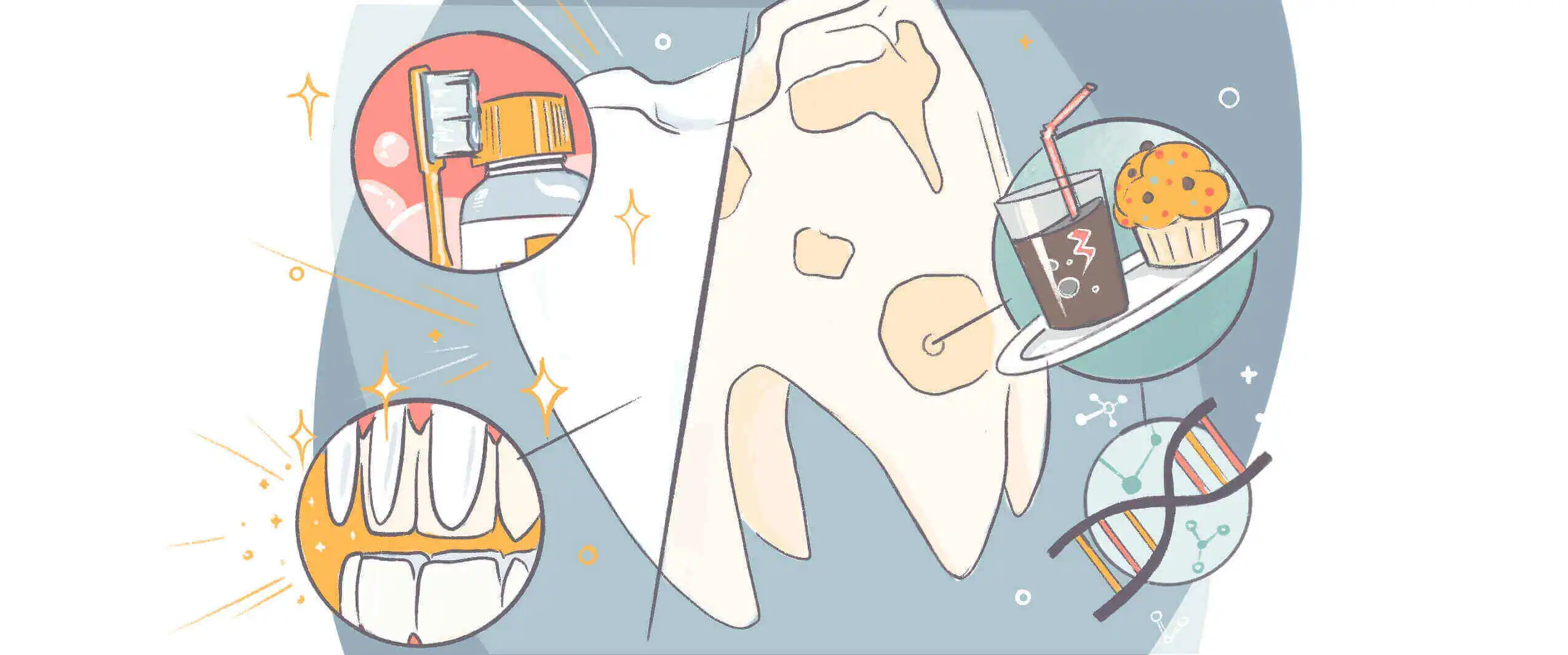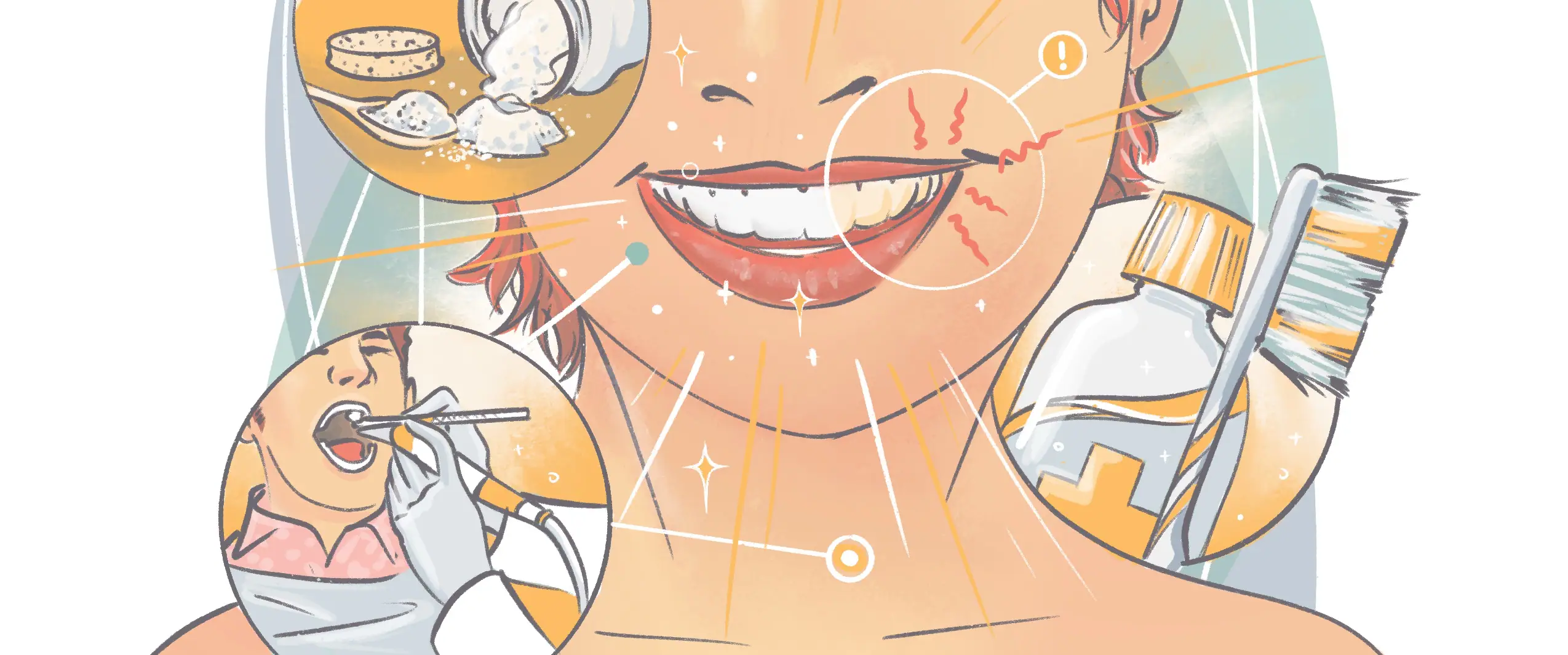Having a sore tongue is actually a common problem. In fact, most oral infections like blisters under the cheeks, tongue, and gums, are pretty widespread. Those inflamed patches of tissue and cracked skin on the corner of your mouth can be painful and hard to ignore. Sore tongue can also be caused by other underlying problems.
Why do I have a sore tongue?
The tongue plays a fundamental role in taste, speech, and helping us eat. But it’s sometimes difficult to pinpoint the exact reason for what’s making it hurt. It could be the result of trauma, oral thrush, mouth ulcers, or other medical issues.
And when a disease affects food intake, it will deprive the body of the necessary nutrients. This link between the disease and nutrient intake could be causing the burning sensations and tongue fissures.
According to the National Institutes of Health, a fissured tongue often suffers from furrows. They are not typically painful on their own, but, you can irritate them and then they will become painful. Reports show that the incidence of tongue fissures or trauma is 5%.
However, when there is chronic trauma, the body could become vulnerable to tongue sores. The same thing can happen with vitamin deficiency. Anything from zinc, vitamins B12 and B2, and folic-acid deficiency can cause an uncomfortable burning sensation of the tongue.
In other words, the sore on the side of tongue doesn’t just appear out of nowhere. Something triggers it, whether it’s a fungus, bacteria, trauma, or something else.
What are the symptoms of sore tongue?
Depending on what’s causing the problem, you may experience a range of different symptoms, including:
- Swelling
- Pain
- Uncomfortable sores
- Change in texture (with spots or patches)
- Burning sensation
- Complete / partial loss of taste
- Change in color and taste
These symptoms are rarely a cause for concern. But, when the body is experiencing a serious health condition that could affect your oral health, then you should seek treatment. In the short term, practicing proper dental hygiene may also help.
What are the causes of sore tongue?
There is a range of various triggers that can cause tongue problems. Most of them heal on their own and are not a serious issue. In other cases, however, the pain, discoloration, and change in texture could be a sign of a more complex health issue.
That includes vitamin deficiency, oral cancer, or food allergies. Therefore, it’s critical to find a dentist or consult with a GP to find the exact cause. Here are the typical causes of tongue issues.
Trauma
You can easily damage this muscular organ. It doesn’t matter if you are chewing and enjoying your favorite food; you can accidentally bite the surface and damage the tissue. Eating anything that is either too cold or burning hot can cause blisters. Clenching and grinding the teeth can also have a similar impact.
Based on a clinical study, most people hurt the anterior dorsum (the back of their tongue). It will take a while for the pain to subside. But, when the injury is mild, it will only cause some minor discomfort and soreness. In cases such as these, it’s best to wait for the injury to heal on its own.
Smoking
Cigarettes have a drastic impact on tongue sores. It can make people vulnerable to cancer, as well as mouth and throat problems. But, surprisingly, quitting can also be problematic for the mouth, though in a different manner.
Research shows that when people stop smoking, they are prone to developing a tongue ulcer. Scientists studied over 1,200 smokers who stopped smoking for one week. 40% of them experienced mouth ulcers, mainly in the first two weeks of abstinence.
Most of them had mild ulcers, while only 8% experienced severe discomfort. In 60% of volunteers, it took them four weeks for the mouth ulcers to completely disappear.
The goal of the research is to prove that these lesions are just temporary, but they are very likely to form in dependent smokers. It is critical that patients overcome this boundary and stop their smoking habit.
Canker sores
Also known as aphthous ulcers, canker sores are a typical problem. They cause soreness and pain. A canker is easy to recognize. It has the shape of a white, round, and tiny spot. Its border is red, and it makes it difficult to talk or eat.
Studies show recurrent canker sores and aphthae (aphthous stomatitis) often form during adolescence and childhood. They affect 20% of the population and come in different types. Most or 80% of cases are minor sores. They are just 5mm in diameter and can heal in about seven to ten days.
The second is major sores. They take a couple of weeks to months to subside and could leave some scarring. The last canker sores are known as Herpetiform ulcers. They feature multiple ulcers and need a month to heal.
There is no clear reason for what causes the canker sores. But it could be stress, large amounts of acidic and spicy food, illness, or hormonal fluctuations.
Oral cancer
Mouth cancer can form on the tongue’s surface inside the squamous cells. It will form a patch or a sore on the tongue that is painful and uncomfortable. However, many sores from oral cancer do not heal on their own. Catch oral cancer early by consulting a dentist.
Sjögren syndrome
This very rare autoimmune disorder affects 0.5% to 1% of the population. It is known for causing inflammation in the lacrimal and salivary glands that cause dry mouth. When the mouth is too dry, the tongue becomes fissured, resulting in damage and a higher risk of infections.
Still need answers?
Book with a top-rated dentist in your city to get the treatment you need.
Inflammation
These red or white bumps, also known as transient lingual papillitis, cause discomfort and pain. They are usually the result of yeast or oral infection that’s affecting the tongue. It’s not uncommon to see white patches as well. Particularly if you have a poor immune system and regularly wear dentures. Some antibiotics and steroid inhalers can also cause oral thrush and tongue inflammation.
Food allergies and sensitivities
Some meals can do more harm than good. Being allergic to food or eating too many products with high acidity levels can cause tongue, mouth, and lip swelling.
Reports show there are 32 million people in the US who have food allergies. 5.6 million of them are children younger than 18. It is critical to recognize the allergies and avoid foods that may trigger a reaction.
According to a food allergy study from 2009 to 2010, 38.7% of 38,480 children had a severe reaction to allergic triggers. And in cases such as these, it is not uncommon to experience tongue sores.
Vitamin deficiencies
Vitamin deficiency, especially of folate, iron, and vitamin B12, can affect the color and texture of the tongue. When left unmanaged, it can cause a burning sensation and discomfort.
Burning tongue syndrome
This syndrome increases the sensitivity and sensation in your tongue. It can also affect the lips, gums, cheeks, and palate. Some people may experience a loss or change in taste.
Neuralgia
This condition is referring to the damage and nerve irritation that’s affecting the tongue. When you experience constant and recurring pain from an infection or trauma, it could be the result of neuralgia. The pain is usually intense. Whenever you try to swallow something, it triggers that discomfort. If you think you have this condition, it’s better to consult a dentist.
Behcet’s illness
Behcet’s triggers inflammation of the blood vessels throughout the entire body. It rarely affects the tongue. But, when it does, people experience tongue sores that look quite similar to canker sores. Studies indicate that the primary cause for the illness is the genes and environmental impact. To manage the sores, you may need to control the illness.
Due for a checkup?
Find a top rated dentist near you that takes your insurance.
The treatment is different for each individual. Patients could use biological or non-biological therapies to control the health issue. However, to get rid of the illness, people will need to rely on non-pharmacological and pharmacological treatments.
Lichen planus
This chronic skin illness can affect the tongue. When the condition is mild, it doesn’t cause significant discomfort. But, the longer it develops, the bigger the chances of it becoming painful and creating red gums.
Moeller’s glossitis
Commonly referred to as the smooth or bald tongue, this problem can cause irritation, inflammation, and burning. The tongue might develop a glossy and smooth surface. It often appears as a result of anemia, celiac illness, or lack of B-12.
Specific medicines
Using anti-inflammatory medication, particularly beta-blockers and naproxen, can irritate the tongue. They can cause sores and discomfort.
Pemphigus vulgaris
Pemphigus typically appears in patients between the ages of 50 and 60. Even though it is a rare disorder, Pemphigus vulgaris can trigger tongue sores. It can also affect your genitalia. The sores will look like blisters, which could tear apart and ooze. This increases the risk of infection.
Tongue conditions are typically diagnosed by your dentist, who will most likely suggest a blood sample to rule out any possible illnesses. After you get a diagnosis, you can find the ideal treatment.
What are some home remedies for tongue conditions?
Oral hygiene should be on the top of your list. Brushing the teeth, flossing, and relying on a mouthwash can get rid of the sores and avoid infection. The key to soothing the soreness is to avoid using a toothpaste that contains sodium lauryl sulfate. Other than that, you can try:
- Avoiding hot and spicy foods
- Rinsing the mouth with saltwater
- Gargling aloe vera juice
- Rinsing the mouth with half a cup of water and one teaspoon of baking soda
- Using diluted 3% hydrogen peroxide in equal parts of water
- Rinsing the mouth with chamomile tea
When should I see a dentist about a sore tongue?
Most tongue sores are not caused by a serious problem. The sore on the tongue can heal on its own. However, if a condition last longer than two weeks, you should consult your dentist.
Still need answers?
Book with a top-rated dentist in your city to get the treatment you need.
Dentists can spot oral diseases or problems early, and a sore tongue can be an early indication of something worse. So, look for a dentist near you who will treat and diagnose your tongue pain.
Final thoughts
Most tongue pains, discomfort, and swelling are not a big problem. You can ignore them and wait for them to heal slowly. But, when the sores appear constantly, it becomes difficult to enjoy a meal, let alone get some sleep.
If you think there is an underlying health issue that’s causing the tongue problems, talk to your dentist. They will pinpoint the cause of your problem and offer the ideal solution. What matters is that you maintain proper oral hygiene and keep your nutrient intake in check. With tactics such as these, you can drastically reduce the risk of sores.








